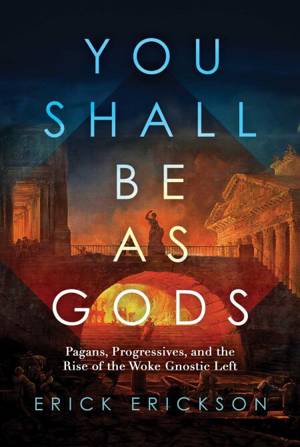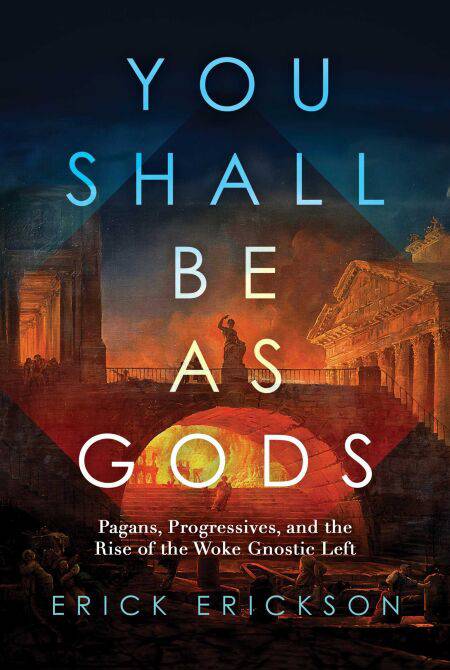
- Afhalen na 1 uur in een winkel met voorraad
- Gratis thuislevering in België vanaf € 30
- Ruim aanbod met 7 miljoen producten
- Afhalen na 1 uur in een winkel met voorraad
- Gratis thuislevering in België vanaf € 30
- Ruim aanbod met 7 miljoen producten
Zoeken
You Shall Be as Gods E-BOOK
Pagans, Progressives, and the Rise of the Woke Gnostic Left
Erick Erickson
E-book | Engels
€ 16,76
+ 16 punten
Omschrijving
Our country doesn’t have a partisan problem, a political problem, a social problem, or an economic problem. We have a spiritual problem.
What in the world is happening? To many Americans, it feels as if reality itself has been turned upside down. Speaking truth, or even suggesting such a thing exists, is labeled as oppression and cause for social banning. Judeo-Christian values once taken for granted are not only routinely ignored, but openly attacked. Why is America being fundamentally transformed before our eyes?
As Christianity has been pushed aside, the Progressive Left has developed a new pagan religion complete with all the trappings: creeds, confessionals, sacraments and mantras, liturgies, shunnings, sacred books, redemptive rituals, and priests and priestesses. But the radical roots of the new secular religion are ancient. We’ve seen it all before. In You Shall Be as Gods, Erick Erickson traces the religion’s roots from Paganism and Gnosticism through the Age of Enlightenment all the way into the Postmodernism of the 21st century. At the heart of the ancient religion is a self-centered culture.
The Christian church today has been weakened by compromising with the neo-pagan religion, leaving the faithful confused and ill-prepared to counter the claims of society’s present-day doctrine. Yet there remains a significant remnant, perhaps even a silent majority, in America that refuses to bow to the rising belief system.
Just as in Rome and countless societies throughout history, the religions present two opposing stories of reality which necessitates conflict. In an era where the “Christian thing” to do seems to be to go along and get along, Erickson makes clear that the two cultures cannot peacefully coexist and calls the reader to speak the truth in love.
What in the world is happening? To many Americans, it feels as if reality itself has been turned upside down. Speaking truth, or even suggesting such a thing exists, is labeled as oppression and cause for social banning. Judeo-Christian values once taken for granted are not only routinely ignored, but openly attacked. Why is America being fundamentally transformed before our eyes?
As Christianity has been pushed aside, the Progressive Left has developed a new pagan religion complete with all the trappings: creeds, confessionals, sacraments and mantras, liturgies, shunnings, sacred books, redemptive rituals, and priests and priestesses. But the radical roots of the new secular religion are ancient. We’ve seen it all before. In You Shall Be as Gods, Erick Erickson traces the religion’s roots from Paganism and Gnosticism through the Age of Enlightenment all the way into the Postmodernism of the 21st century. At the heart of the ancient religion is a self-centered culture.
The Christian church today has been weakened by compromising with the neo-pagan religion, leaving the faithful confused and ill-prepared to counter the claims of society’s present-day doctrine. Yet there remains a significant remnant, perhaps even a silent majority, in America that refuses to bow to the rising belief system.
Just as in Rome and countless societies throughout history, the religions present two opposing stories of reality which necessitates conflict. In an era where the “Christian thing” to do seems to be to go along and get along, Erickson makes clear that the two cultures cannot peacefully coexist and calls the reader to speak the truth in love.
Specificaties
Betrokkenen
- Auteur(s):
- Uitgeverij:
Inhoud
- Aantal bladzijden:
- 432
- Taal:
- Engels
Eigenschappen
- Productcode (EAN):
- 9798888450697
- Verschijningsdatum:
- 24/06/2024
- Uitvoering:
- E-book
- Beveiligd met:
- Adobe DRM
- Formaat:
- ePub

Alleen bij Standaard Boekhandel
+ 16 punten op je klantenkaart van Standaard Boekhandel
Beoordelingen
We publiceren alleen reviews die voldoen aan de voorwaarden voor reviews. Bekijk onze voorwaarden voor reviews.











